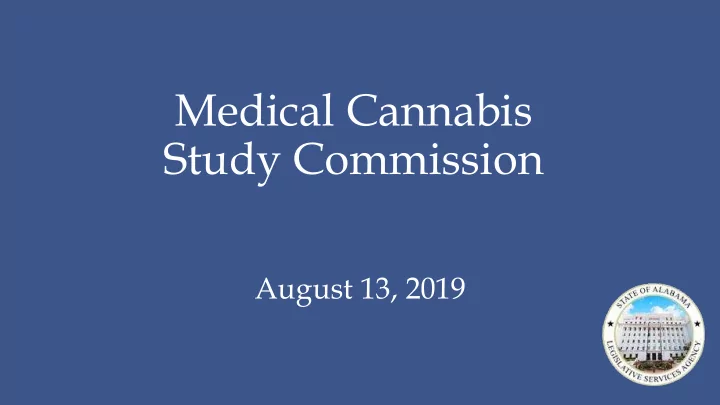

Medical Cannabis Study Commission August 13, 2019
Act 2019-511 (SB236 by Sen. Melson) Directs the Study Commission to: • Hold at least 3 public hearings to garner opinions from patients, health care providers, and the public on medical use of cannabis • Examine current federal and state regulation of medical cannabis • Make recommendations to the Legislature by December 1 st .
“Cannabis” “All parts of any plant of the genus cannabis, whether growing or not, including the seeds, extractions of any kind from any part of the plant, and every compound, derivative, mixture, product, or preparation of the plant.” (SB236, as engrossed)
“Cannabis” vs. “Marijuana” vs. “Hemp” Both marijuana and hemp are classified as being in the genus Cannabis Marijuana: High THC; low CBD Hemp: Low THC; high CBD
Medical Marijuana in Other States • At least 33 states (plus D.C., Guam, Puerto Rico, and US Virgin Islands) have approved a comprehensive publicly available medical marijuana/cannabis program • In addition, at least 18 states allow use of high CBD/low THC products for medical reasons in limited situations (ex: Carly’s Law and Leni’s Law)
Common Elements Among States • Protection from criminal penalties for using marijuana for medical purposes • Access to marijuana through home cultivation, dispensaries, or other system • Requires health care professional’s recommendation or certification • Often requires patient to have a serious medical condition (ex, cancer, AIDS, PTSD, MS, debilitating pain or sever nausea, etc.)
Common Elements ( con’d ) • Legal protections for health care professionals who issue certifications • Allow designated caregivers to assist patients (e.g., pick up medicine from dispensary, cultivate) • Most states prohibit smoking in public • Most states limit where products may be possessed and used (e.g., not in correctional facilities, near schools, at work, etc.)
SB236: The Compassionate Access, Research Expansion Act (CARE Act) • Creates the Alabama Medical Cannabis Commission • Establishes a system for registering patients • Establishes a licensing and regulatory framework for medical cannabis facilities • Levies taxes on retail sales of cannabis products and on licensed facilities
Duties of the Medical Cannabis Commission (CARE Act) • Establish and administer a patient registry system • Establish a tracking system to track seed – to-sale production • License and regulate medical cannabis from seed to sale: cultivation, processing, transportation, packaging, and dispensing of cannabis • Adopt rules
Terminology (CARE Act) • Qualified Physician • Qualified Patient • Qualifying Condition
Administration of Patient Registry by Commission • Receive physician certifications electronically • Accept patient and caregiver registration applications and fees and process patient and caregiver registrations • Issue medical cannabis cards to qualified patients and/or their caregivers • Patient Registry accessible to law enforcement, health care providers, and dispensaries
Certification of Patient by Qualified Physician • Conduct physical examination in the same room as patient and fully assess patient’s medical history • Diagnose patient with a qualifying condition • Determine use of cannabis would likely outweigh the potential health risks • Obtain written consent • If “medically appropriate,” refer patient to a specialist • Register patient electronically in patient registry system
Physician’s Ongoing Role (con’d ) • May reissue (i.e., renew) certification • May deactivate certification • Commission may monitor physician certifications for misuse and unlawful diversion by the physician and recommend disciplinary action to the Board of Medical Examiners
Licensing and Regulation of Cannabis Facilities • Commission has broad latitude in how, who, and where to license “providing the greatest benefits to the residents of this state” • Establish process for issuing new licenses, renewal, revocation, suspension, transfer of licenses • Establish license fees of not less than $10,000 for a stand-alone facility • Location of any licensee may not be within 1,000 feet of a pre- K or K-12 school
Quality Control • Commission must establish protocols for product testing during cultivation, processing, and dispensing to ensure product is consistently medical grade
Employer Rights • Need not permit or accommodate an employee’s use or possession of medical cannabis in the workplace, modify a job or working conditions of an employee who uses medical cannabis • May refuse to hire, discharge, discipline or take other adverse employment action against an employee because of the employee’s “use or possession of medical cannabis” • May establish and enforce a drug-free workforce program or drug testing policy
Taxes • 4% state sales tax plus local sales tax • 9% tax on gross proceeds on sales when sold at retail • Privilege tax on licensees at 10% of their net worth
Criminal Protections Provides that a person has not committed the crime of unlawful possession of marijuana if the person is in possession of a medical marijuana card, unless there is reasonable cause to believe the information on the card is false or falsified, or the person is otherwise in violation of the CARE Act.
Other provisions of CARE Act • Allows counties and municipalities to opt out of allowing any licensed facilities in their jurisdiction • Reciprocity with other states • Directs Commission to report to Legislature
Other elements in state laws that are not in SB236 • Prohibits use by certain professions such as law enforcement and firefighters, violent ex-felons • Prohibits discrimination • By landlords (but landlords may prohibit smoking on premises) • In receiving organ transplants • In child custody cases or visitation rights • By schools, unless doing so results in loss of federal funding • By any licensing or occupational board • Limits the total amount of product patient may possess to avoid prosecution
Paula Greene Legislative Attorney Legislative Services Agency, Legal Division pgreene@lsa.state.al.us
Recommend
More recommend